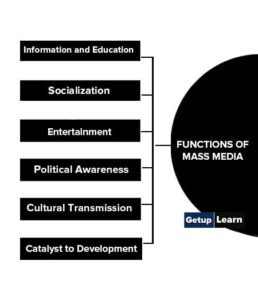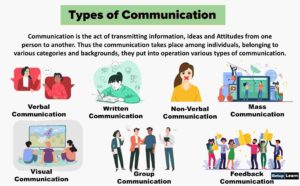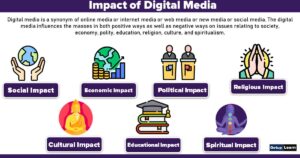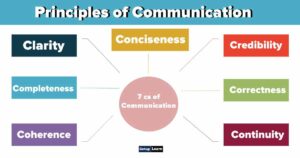Table of Contents
What is Informal Communication?
Informal communication is the casual and unofficial form of communication wherein the information is exchanged spontaneously between two or more persons without conforming to the prescribed official rules, processes, systems, formalities and chain of command.
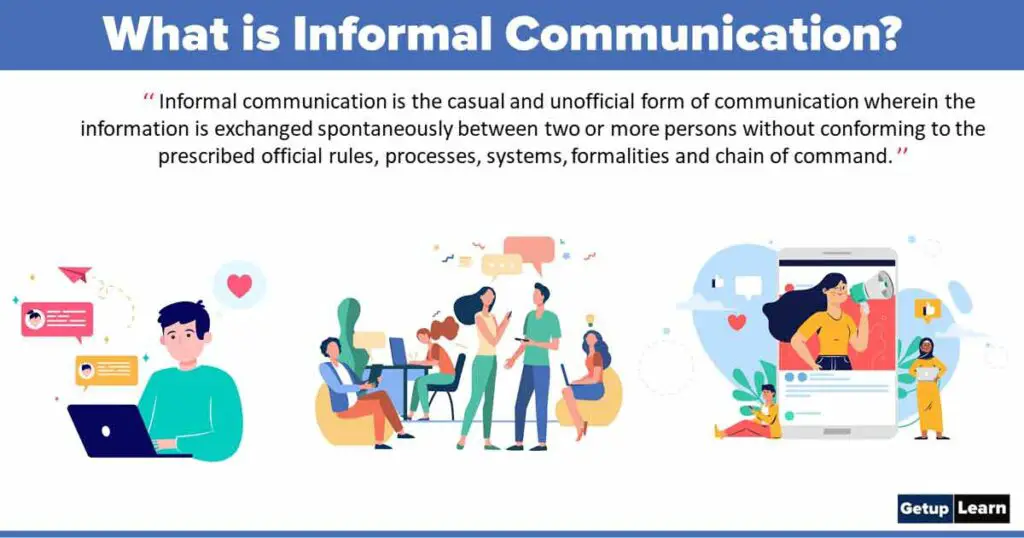
Table of Contents
Informal communications are based on personal and informal relationships such as friends, peers, family, club members and so forth. This form of communication does not take into consideration the organizational conventional rules and other formalities.
In the organizational framework, informal communication is also termed grapevine communication.
Types of Informal Communication
Followings are the types of informal communication:

Single Strand
Under the single strand network, the flow of information takes place from one person to another. One person will make provision of information to the other, who will, in turn, communicate the information to the next person. In the same way, the third person will also communicate the information to the next person and so on.
One of the major disadvantages of this form of network is, the information is less reliable and accurate to pass on the message. The communication process in this case is linear.
Gossip Chain
In the case of the gossip chain network, the individual imparts information to all the other individuals in the network in a direct manner. This individual is regarded as the main person, who performs the job duty of transmitting information that he has obtained.
In this case, every person in the network communicates with each other in an informal manner. This network is made use of in most cases when the subject matter is not related to the nature of the job.
Probability Chain
In this form of communication network, information passes randomly from one individual to another. In this case, there is an individual, who acts as the source of the message. He selects any person randomly in the network to communicate the message.
The second person will make a selection of another person on a random basis and passes the information to him. Hence, communication flows to different individuals, who have been selected on a random basis. In this case, the source of information for each member of the network is different.
This communication network is made use of in the case of information, which is interesting. But the information is not significant.
Cluster Chain
In the cluster chain network, there is an individual, who acts as the source of the message. He performs the job of transmitting information to the pre-selected group of individuals, out of whom, few individuals convey the same message to the other selected group of individuals.
In this manner, the chain continues and the message reaches all the individuals in the communication network. This pattern is similar to the telephone tree. In which one person calls two other persons, these two persons call three other persons and again these three persons call three other persons.
In this manner, the information gets transmitted to all the persons, connected to the telephone network. This is regarded as one of the common forms of the informal communication network.
Characteristics of Informal Communication
Followings are the characteristics of informal communication which are given below:
- Unofficial Channel of Communication
- Not Controlled by Management
- More Reliable Information
- Flexibility
- Oral Way of Communication
- Rapid Communication
- Free From Accountability
- Multi-directional
- Spontaneity
- Influential

Unofficial Channel of Communication
When informal communication takes place in organizations, it does not have to abide by any rules and regulations. In other words, the members do not have to take into account any organizational rules and laws. In this case, the individuals do not communicate with each other in terms of work-related aspects but normally communicate with each other in terms of other areas.
These may be related to home, family, health, well-being and so forth. Within the course of performance of one’s job duties, when the individuals form amicable terms and relationships with each other, they not only communicate in terms of work-related aspects but also establish cordial terms and relationships as well.
Therefore, it can be stated that one of the important characteristics of informal communication is, it is an unofficial channel of communication.
Not Controlled by Management
The management within the organizations are vested with the authority of controlling formal communication, but they do not exercise any control over informal communication systems. The employees are vested with the power and authority of exercising control over the informal systems of communication.
The information that is conveyed through this form of communication may or may not be accurate. When the management exercises control on the system of formal communication, the information is accurate and is related to work, but when the system of informal communication is not controlled by management, the information may or may not be accurate.
Therefore, the system of informal communication not controlled by management is one of the important characteristics of informal communication.
More Reliable Information
Research studies conducted on informal communication in organizations has identified that the information that is imparted through informal networks are more reliable. Promoting reliability is regarded as one of the major aims of communication. Hence, they put emphasis on this form of communication.
On the other hand, the individuals in some cases are unable to understand that information can be false and misleading as well. The individuals from the viewpoint that encouragement of informal communication systems will help the individuals in the achievement of the desired outcomes in an appropriate manner, incurring the feeling of job satisfaction and retaining their jobs, as the information obtained is more accurate and reliable.
Therefore, the prevalence of the viewpoint among the members that informal communication imparts more reliable information is one of the important characteristics.
Flexibility
Informal communication does not take place in a methodical and systematic manner within the organizations. There are not any rules, which the members are required to follow within the course of its implementation. Hence, it is flexible in nature.
The flexible nature of this form of communication enables the individuals to put it into operation in any form, without any formalities. When the members recognize the flexible nature of this form of communication, they form the view that it will be more effective and meaningful in generating awareness and in acquiring an understanding of the concepts and aspects required in the efficient implementation of one’s job duties and achieving organizational goals.
Therefore, flexibility is regarded as one of the important characteristics of informal communication.
Oral Way of Communication
In the system of informal communication, the individuals communicate with each other in an oral manner. In most cases, they communicate with each other face to face. But when the individuals need to communicate with each other, who belong to different departments, they may speak to each other on the phone or send messages or emails.
But normally, the oral way of communication is focused upon and the written way of communication is not emphasised upon. When the individuals meet each other and communicate face to face, then they are able to acquire an efficient understanding of the aspects and topics, in terms of which communication takes place.
Therefore, the oral way of communication is regarded as an important characteristic of informal communication.
Rapid Communication
Informal communication transmits to others in a rapid manner. When the information is important and the individual, who is imparting it ensures that it should get transferred to others in a rapid manner, in such cases, this characteristic is beneficial. But one of the important limitations of this characteristic is, the information may not be accurate.
When communication takes place in a rapid manner, the information may lose its accuracy. When the individuals do not obtain accurate information, they will experience problems in the implementation of tasks and activities in a well-organized manner and in generating the desired outcomes.
Therefore, it can be stated, the characteristic of rapid communication of informal communication may be advantageous as well as disadvantageous.
Free From Accountability
Informal communication is free from any form of accountability of the top management. When the top management gives instructions or orders to their subordinates, they usually need to pay attention to their accomplishment by the target date. On the other hand, when information is conveyed in an informal manner, the employees do not feel pressurised that they have to complete the task by the specified date.
The system of informal communication usually takes place in a friendly manner. Hence, when the communication is free from accountability, the employees do not experience any problems or stress within the course of implementation of one’s job duties.
Therefore, being free from accountability is regarded as one of the indispensable characteristics of informal communication.
Multi-directional
Informal communication is multi-directional in nature. As the name implies, it does not proceed in one direction, but multiple directions. In this communication, the individuals have their own interests and needs which they aim to fulfil. For instance, when individuals communicate with others in order to make provision of help and support to them to fulfil their needs and requirements.
On the other hand, another purpose of informal communication is to motivate employees and so forth. One of the important factors that need to be taken into account is, individuals need to make use of polite language and decent words. In some cases, there are spread of rumours too and these need to be avoided.
Therefore, multi-directional is regarded as an important characteristic of informal communication.
Spontaneity
The informal system of communication takes place among individuals through the spontaneous exchange of information. This form of communication may take place among the members of the organizations employed in various positions. When they are communicating, they impart information in a spontaneous manner.
This indicates that information is imparted in an unplanned and structured manner. In this case, the information may be meaningful and beneficial to the individuals or they may not be meaningful and beneficial. When the members are experienced and well-aware in terms of their job duties, they are able to acquire an efficient understanding of spontaneous information and implement it satisfactorily.
On the other hand, when members are not experienced, they undergo problems through this characteristic. Therefore, spontaneity is regarded as an important characteristic of informal communication.
Influential
The system of informal communication is influential. When the individuals communicate with each other through this system of communication, they are able to obtain help and support from each other. It is comprehensively understood that individuals need to obtain support and assistance from each other in the effective performance of their job duties.
But in order to feel comfortable within the working environment and in retaining their jobs, they need to get engaged in informal communication as well. The characteristic of influence is regarded as vital as it enables the individuals to retain their jobs as well as incur the feeling of job satisfaction.
Furthermore, the individuals need to be well-aware in terms of all the disadvantages and implement measures in curbing them. Therefore, the characteristic of influence is regarded as significant in informal communication.
Advantages of Informal Communication
Followings are the advantages of informal communication:
- Alternative System
- Interpretation
- Redressing Grievances
- Increasing Efficiency
- Improving Relations
- Providing Recommendations
- Providing Emotional Relief
- Providing Solutions to Problems
- Increasing Job Satisfaction
- Measuring Reaction
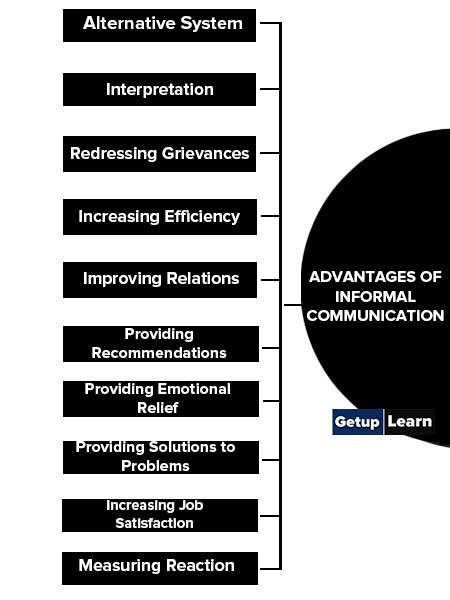
Alternative System
Within organizations, there is some information, which cannot be imparted through a formal system of communication, therefore, the members need to communicate in terms of it through an alternative system. An informal system is regarded as the alternative system, which conveys various types of information among the members.
Within organizations, the primary aim of communicating is to impart information in terms of measures and approaches that are needed to perform one’s job duties well and achieve the desired outcomes. The informal system of communication is regarded as worthwhile in imparting information in terms of job duties. Therefore, an alternative system is regarded as one of the major advantages of informal communication.
Interpretation
When the superiors send messages or impart knowledge in terms of various factors to their subordinates, they will be able to understand them well, when they are explanatory in nature. Hence, an informal system of communication is regarded as effective in interpreting the information in an appropriate manner.
In some cases, through a formal system, the message may not be easily understandable to the employees. Therefore, in order to ensure that employees are able to interpret the messages well, the supervisors, managers and employers impart information through informal systems. Therefore, interpretation is regarded as one of the advantages that is facilitated through informal communication.
Redressing Grievances
Within the organizations, the members at various positions experience problems and difficulties as well. These are regarded as major impediments within the course of implementation of their job duties. Hence, it is vital to solving problems and grievances.
These are necessary not only in achieving professional goals but also in augmenting the overall structure of the organization. Through the system of informal communication, the individuals are able to redress their grievances to their superiors and seek solutions.
They can be done online or through oral communication. Therefore, acquiring opportunities to redress grievances are regarded as one of the advantages of informal communication.
Increasing Efficiency
In the case of informal communication, the employees are provided with opportunities to express their ideas and viewpoints. If they are experiencing any problems in the performance of their job duties, they are able to obtain help and support from others without any hesitance.
In other words, they do not experience apprehensiveness in communicating with others. The employees will be able to freely express their ideas and viewpoints when they will be able to promote a cordial and sociable working environment and overcome apprehensiveness and vulnerability.
In addition, they will also be able to increase efficiency. Therefore, increasing efficiency is regarded as one of the important advantages of informal communication.
Improving Relations
Through informal communication, the individuals will be able to bring about improvements in terms and relationships with each other. It is not only important for the individuals to generate information in terms of performance of job duties but to retain their jobs and enhance the structure of the organization, it is of utmost significance to focus upon improving relations.
In order to achieve organizational goals, it is vital for the members to work in coordination and integration with each other. Hence, in order to promote mutual understanding, informal communication is indispensable. Therefore, improving relations is regarded as one of the important advantages of informal communication.
Providing Recommendations
In order to carry out one’s job duties well, the subordinates, superiors and colleagues communicate with each other in terms of ideas, suggestions, processes, methods, materials and so forth. Through informal communication, the members of the organization provide recommendations, which would be assisting in the implementation of one’s job duties and in generating the desired outcomes.
Recommendations can be provided in verbal as well as in a written form. When they are brief, they can be imparted orally, whereas, when they are lengthy, they are given in writing. Therefore, it can be stated, providing recommendations is regarded as one of the essential advantages of informal communication.
Providing Emotional Relief
In some cases, within the working environment, the individuals experience psychological problems of stress, anxiety and pressure. When they get engaged in informal communication, they are able to acquire emotional relief in providing solutions to their problems.
Within the course of implementation of one’s job duties, it is vital for individuals to overcome all types of impediments. When they get engaged in informal communication with other individuals, they are able to find relief from their problems. Furthermore, through this form of communication, they are able to enhance their knowledge and skills.
Therefore, providing emotional relief is regarded as one of the important advantages of informal communication.
Providing Solutions to Problems
It is comprehensively understood that individuals need to take into account and pay attention to a number of factors. In other words, they have numerous tasks and responsibilities, these include, home, family, jobs and so forth. When they get engaged in informal communication, they are able to generate awareness in terms of the development of time management skills.
These skills enable them to assign priorities to tasks and activities and provide solutions to various types of problems that may arise. Therefore, it can be stated, providing emotional relief is regarded as one of the important advantages of informal communication.
Increasing Job Satisfaction
The implementation of informal communication leads to an increase in the feeling of job satisfaction. The individuals feel pleasurable, contented and motivated within the working environment. These factors are not only necessary in leading to effective implementation of job duties, but also in retaining one’s jobs.
In order to lead to an increase in the feeling of job satisfaction and develop motivation, interest and enthusiasm, it is necessary for the individuals to get engaged in informal communication. Therefore, it can be stated, increasing job satisfaction is regarded as one of the important advantages that is facilitated through informal communication.
Measuring Reaction
Before any new information is released, the management aspires to generate awareness in terms of the reaction of employees. It is necessary for the management to take into account that employees should not feel overwhelmed and pressurised. They need to put into operation their job duties with interest and enthusiasm.
Through informal communication, the management is able to find out the reaction of the employees, before they impart any kind of information through formal channels. For instance, before initiating modern and innovative methods, it is necessary to measure the reaction of the employees.
Therefore, it can be stated, measuring reaction is regarded as one of the crucial advantages that is facilitated through informal communication.
Limitations of Informal Communication
The limitations of informal communication are stated as follows:
- Lack of Control
- Misinterpretation
- Distort Meaning
- Spread Rumour
- Lack of Confidentiality
- Incomplete Information
- Committing Errors
- Generation of Undesired Outcomes
- Development of Perplexity
- Non-co-operation

Lack of Control
When informal communication gains prevalence within the organizations, the members are unable to control it. In other words, the individuals are unable to put into operation the measures and approaches and prevent it from assuming a major form.
In accordance with the research studies, informal communication is regarded as important, but it needs to be controlled. The reason being, in this case, lack of rules and procedures enables it to cause detrimental effects upon the job performance of the members and overall functioning of the organizations.
Due to this factor, the members are unable to exercise control. Therefore, lack of control is one of the major limitations of informal communication.
Misinterpretation
When information is imparted through informal communication, in some cases, it is likely to get misinterpreted. In other words, the employees experience problems in acquiring their efficient understanding. Particularly, when the information is in a written form and the words are not clearly understood, this causes misinterpretation among employees.
Furthermore, it has unfavourable influences on the job performance of the individuals. Therefore, misinterpretation is regarded as one of the major limitations of informal communication.
Distort Meaning
Informal communication networks do not follow any set of rules, guidelines or approaches. Hence, the transmission of information takes place without any hesitance or fear. In some cases, the individuals may not depict kindness and courtesy, while communicating.
The information may lead to incorrect meaning, which may prove to be unfavourable to the employees as well as other members. Therefore, distorted meaning is regarded as one of the major limitations of informal communication.
Spread Rumour
In most cases, informal communication devises some type of information, which may not be factual and have unfavourable effects upon the performance of the employees and the overall functioning of the organization. The employees are likely to take this information seriously and it imposes detrimental effects upon their job performance.
Therefore, the spreading of rumour through this form of communication is regarded as one of the major limitations of informal communication.
Lack of Confidentiality
In this form of communication, the individuals interact with each other without any rules and laws. The information, which needs to be kept confidential is also likely to be communicated and this has detrimental effects upon the performance of job duties of the members as well as the overall functioning of the organization.
In other words, the employees are unaware of the fact that they need to keep some information confidential and not disclose it to other individuals, who may be internal or external to the organization. Therefore, lack of confidentiality is regarded as one of the important limitations of informal communication.
Incomplete Information
In some cases, the information that is communicated through this form of communication is not complete. In order to perform one’s job duties satisfactorily and attain the desired outcomes, it is vital for the members to acquire complete information.
When the information is not complete, they experience problems in the effective implementation of their job duties and in the generation of desired outcomes. Therefore, providing incomplete information is regarded as one of the limitations of informal communication.
Committing Errors
The members of the organization are more likely to commit errors when they are communicating through informal channels. The reason is, they are not following any rules or procedures. Hence, it is not possible for individuals to communicate the information without committing errors.
Therefore, when individuals are not able to receive information in a systematic and methodical manner, they are likely to commit errors in the implementation of job duties and in the achievement of goals and objectives. Therefore, committing errors is one of the limitations of informal communication.
Generation of Undesired Outcomes
When the members of the organization are unable to receive factual information, and information that is not easily understandable to the individuals, they experience problems within the course of the generation of desired outcomes. In order to generate the desired outcomes, the communication needs to take place in a methodical and systematic manner.
Hence, when communication does not take place in a methodical and systematic manner, the individuals experience problems in performing their job duties well. Therefore, the generation of undesired outcomes is one of the limitations of informal communication.
Development of Perplexity
Through informal communication channels, the information is not easily understandable. In some cases, the individuals are unable to acquire their efficient understanding. This is apparent that when the information will not be clearly understandable to the members, they will experience problems within the course of performance of their job duties in a satisfactory manner.
Lack of rules, regulations, strategies, guidelines and procedures are the major causes that would lead to the development of perplexity. When the individuals develop perplexity, they are likely to get engaged in conflicting situations and disagreements as well. Therefore, the development of perplexity is regarded as one of the major limitations of informal communication.
Non-co-operation
When the information that is imparted to the employees is not easily understandable to the members, they are unable to promote collaboration and integration. When they will not obtain support and assistance, they will experience problems within the course of performance of their job duties in a well-organized manner and in the achievement of organizational goals. In this manner, there is the development of non-co-operation among members.
As a result of non-co-operation, the members are likely to remain in seclusion and do not tend to interact with others much. Therefore, it can be stated, non-co-operation is one of the crucial limitations of informal communication.
What are the types of informal communication?
The following are the types of informal communication:
1. Single Strand
2. Gossip Chain
3. Probability Chain
4. Cluster Chain.
What are the characteristics of informal communication?
The following are the characteristics of informal communication:
1. Unofficial Channel of Communication
2. Not Controlled by Management
3. More Reliable Information
4. Flexibility
5. Oral Way of Communication
6. Rapid Communication
7. Free From Accountability
8. Multi-directional
9. Spontaneity
10. Influential.
What are the advantages of informal communication?
The following are the advantages of informal communication:
1. Alternative System
2. Interpretation
3. Redressing Grievances
4. Increasing Efficiency
5. Improving Relations
6. Providing Recommendations
7. Providing Emotional Relief
8. Providing Solutions to Problems
9. Increasing Job Satisfaction
10. Measuring Reaction.
What are the limitations of informal communication?
The following are the limitations of informal communication:
1. Lack of Control
2. Misinterpretation
3. Distort Meaning
4. Spread Rumour
5. Lack of Confidentiality
6. Incomplete Information
7. Committing Errors
8 Generation of Undesired Outcomes
9. Development of Perplexity
10. Non-co-operation.



